Chiang Mai isn’t exactly known for being the poster destination for responsible tourism, a land known for elephant rides and tiger temples — not the most ethical experiences to have when traveling.
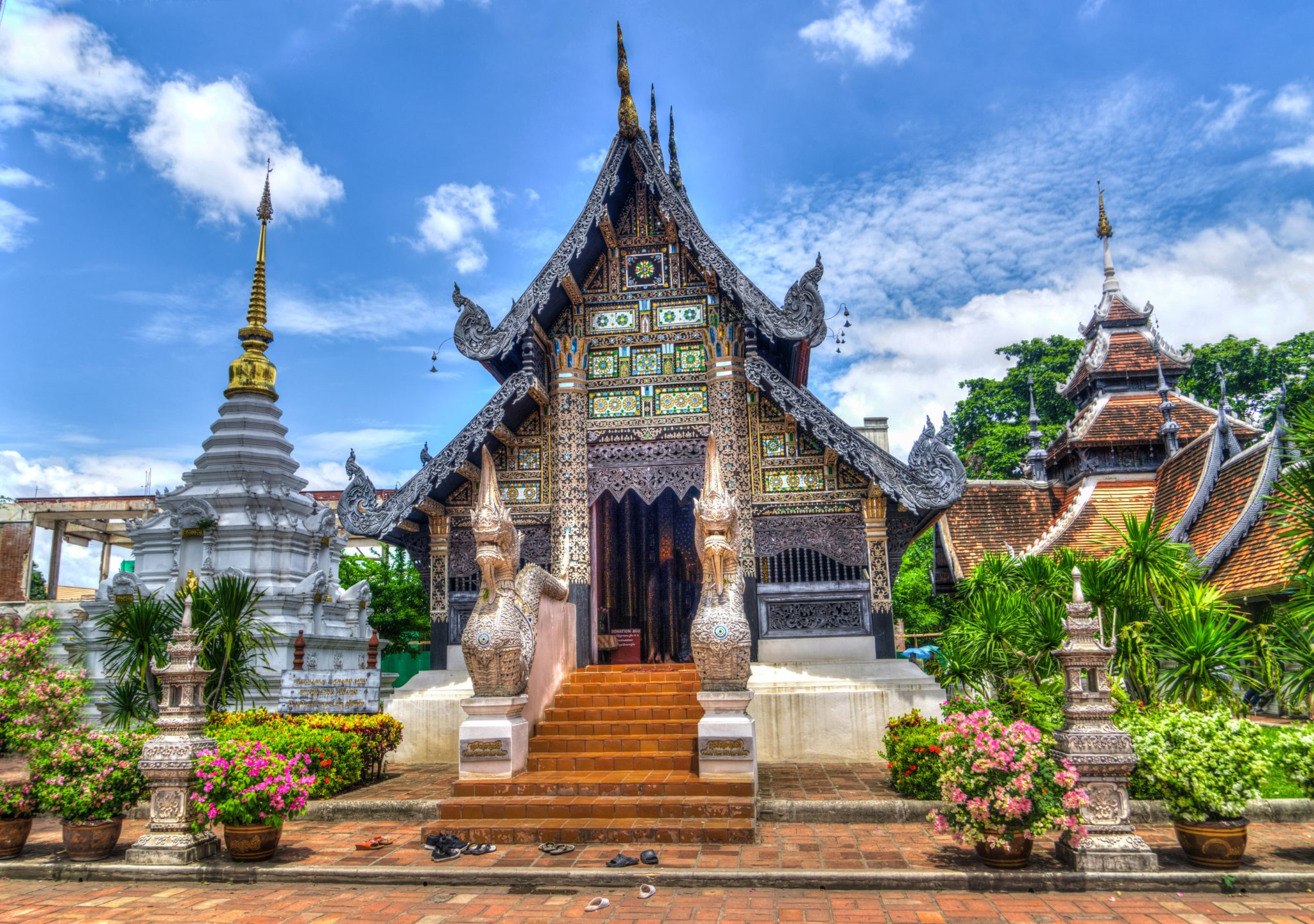
On a recent trip I had a number of not only local, cultural experiences (Chiang Mai is having an explosion of counter culture-style coffee shops opening up in recent years), but also those with a global good twist. To help you enjoy Chiang Mai responsibly, here are six experiences to add into your trip itinerary.
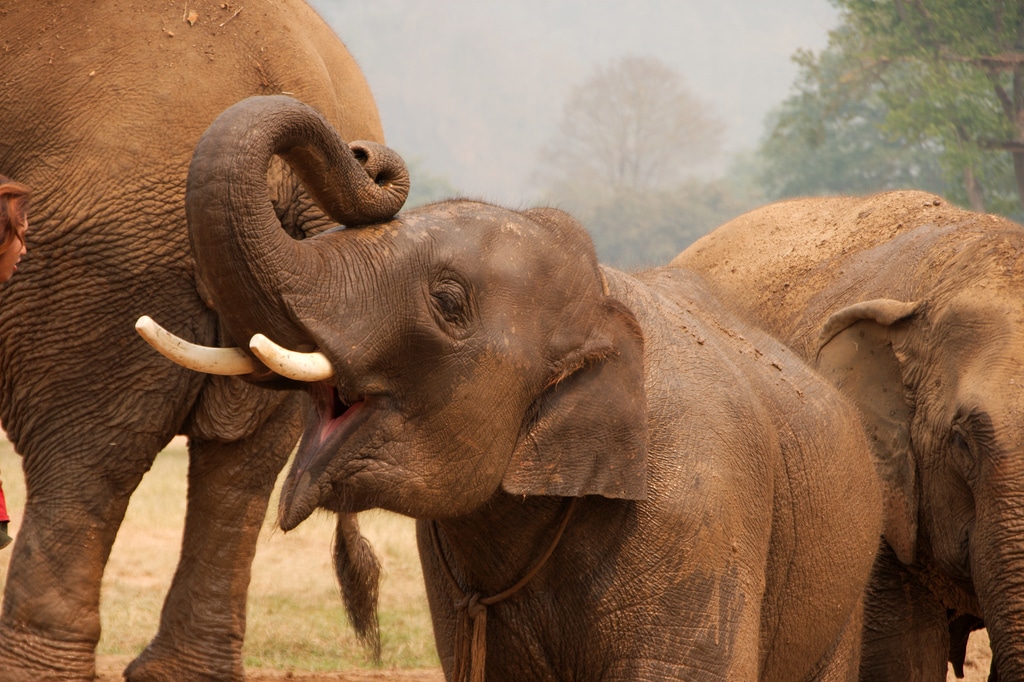
Adorable elephants at Elephant Nature Park. Photo courtesy of Christian Haugen/flickr.
1. Get Artistic At Elephant Parade House
One afternoon I took a walk from the Old City — where I was staying with a friend — heading west over the Nakhon Phing Bridge and made a right onto Charoen Rat Road. If you like art, this is exactly where you want to be, as craft shops, wood carving galleries and hand-crafted paper goods litter the neighborhood. While you can easily spend hours perusing the numerous venues, many of which also have coffee shops and tranquil gardens attached, one particular spot that captured my head was Elephant Parade House. The shop, which boasts being home to “the world’s largest art exhibition of decorated elephant statues,” features hundreds of beautifully-painted elephant statues done in myriad patterns filling the shelves of two rooms.

You can purchase one (when you do you’ll get a certificate telling you more about where and how it was made) or even paint your own elephant. Twenty percent of their revenue goes to nonprofits dedicated to helping elephant welfare and conservation projects.
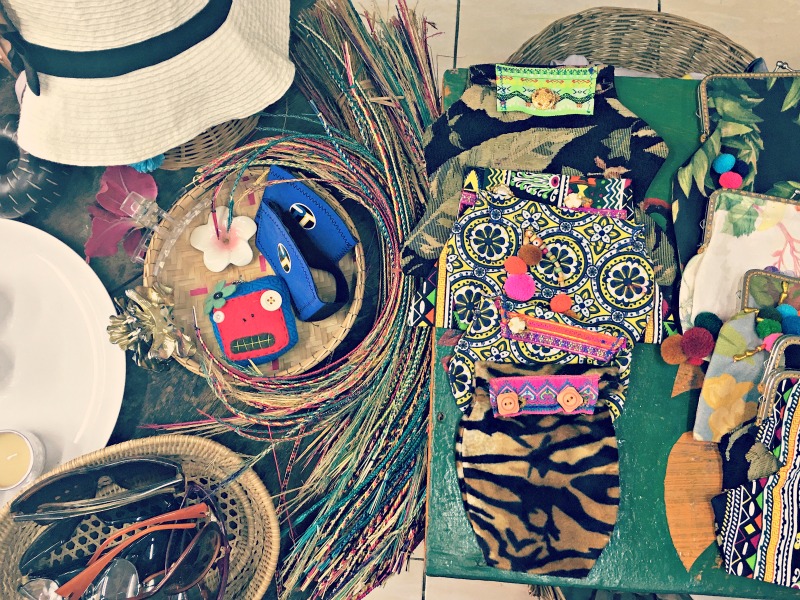
Some items from the onsite charity shop at Freedom House
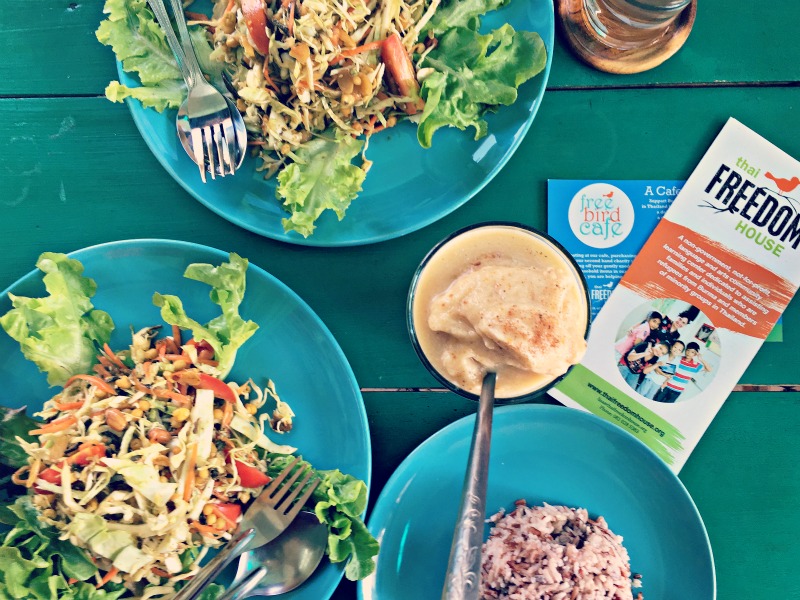
A delicious lunch at Free Bird Cafe, where 100% of the proceeds go to supporting Freedom House.
2. Eat Up For A Cause At Thai Freedom House
Thai Freedom House not only delivered one of the most delicious meals I had during my time in Chiang Mai through their onsite Free Bird Cafe, but this non-government, not-for-profit, language and arts community learning center focuses on assisting Burmese refugees and Thai minority groups. The onsite school not only helps students learn Shan language and culture (the largest ethical minority group in Burma), Burmese and English, and expand their creativity through art and music, but it gives them a sense of confidence and place to build a community. Moreover, regular workshops focus on everything from AIDs prevention to yoga to magic tricks. Note: 100% of profits from the onsite cafe and artisan shop go toward supporting the learning center.
A few recommendations off their organic, vegetarian Thai/Burmese menu:
- The Burmese Green Tea Leaf Salad, an eclectic explosion of flavors and textures with pickled tea leafs, roasted peanuts, crunchy beans, fried garlic, chopped tomatoes and toasted sesame seeds
- A vegan smoothie containing Almond mYlk, dates, cinnamon, raw local honey and organic coconut oil
- A Raw Choco Charlie raw vegan cake with raw organic cocoa powder, raw organic coconut oil, cashews, dates and Himalayan pink salt
- A Coconut Love Bomb made with real coconut and raw organic cacao or pour yourself espresso
- Shan Savory Pumpkin Ginger Curry (Mak Baak Hung) with peanuts added for texture
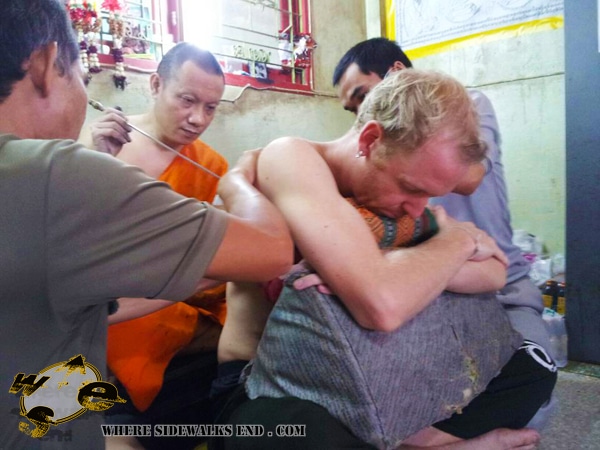
The Where Sidewalks End founder himself getting a Sak Yant

Choose which Sak Yant tattoo holds special meaning to you
3. Get A Sak Yant Tattoo From A Monk In A Responsible Fashion
This is offered by Where Sidewalks End, a responsible tourism company focused on offering experiences you can’t really do yourself, based in Chiang Mai started by one of my best friends — and the person I stayed with during my time in Thailand — Ian Ord. While the company offers a number of ethical bespoke experiences (no elephant rides or Full Moon parties here), their most popular tour is taking visitors to get a Sak Yant (bamboo tattoo with dye made from natural ingredients) by a vetted Ajarn (tattoo master) passionate about maintaining the practice’s ancient traditions.
There’s also a translator facilitating an exchange of culture between the monk and the guest, and all guests are given a book on Sak Yant, the chance to an amulet market with folklore items (some with special powers) and a local lunch. Bonus: $1/day per guest from their tours gets donated to one local environmental/animal project (impacting the planet), and another $1/day for each guest to a local social project (impacting the people). For example, in Thailand they work with In Search Of Sanuk, a nonprofit providing shelter, food and educational support for trauma survivors, especially at risk women and girls.
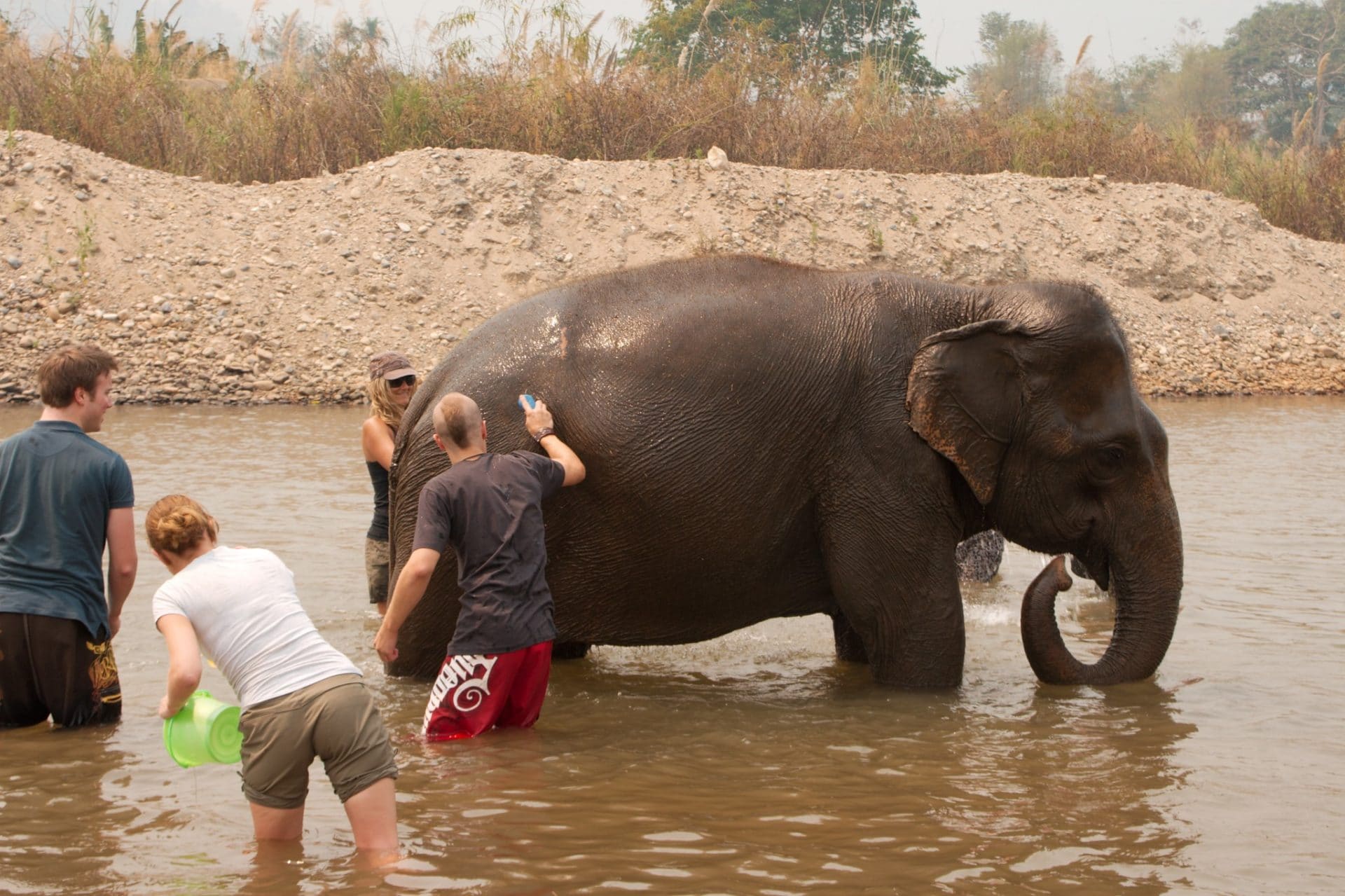
Bathing elephants at Elephant Nature Park. Photo courtesy of Christian Haugen/flickr.
4. Bathe An Elephant At Elephant Nature Park
Chiang Mai is notorious for being home to tour operators who tout themselves as being responsible, when really they practice animal cruelty. This is especially true when it comes to elephants, who are often severely abused and mentally broken down by the Thai tourism industry. One way to have an encounter with these majestic creatures without harming them is by visiting Elephant Nature Park, an elephant rehabilitation center geared towards educating visitors and providing the animals with an abuse-free environment. Here, you’ll spend the day bathing and feeding rescued elephants, watching elephants and other rescued animals from buffalo to cats roaming free, rafting, jungle hiking, having a healthy local lunch and more. If you’re starting Bangkok, you may want to opt for an 8-day round-trip Elephant Nature Park-themed tour with Where Sidewalks End.
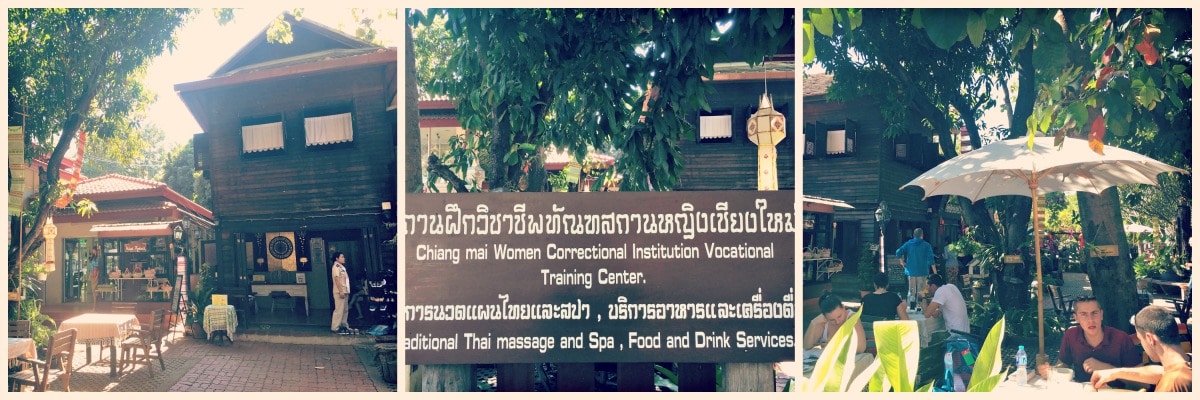
Get a massage by an ex-prisoner while helping these women earn an income
5. Get A Massage From An Ex Prisoner & Sip a Coffee at Ahka Ama
While there are myriad massage parlors in Chiang Mai, one that captured my interest was the Women’s Massage Center by Ex-Prisoners. The Thai Correctional Vocation Center trains women almost due for release to be professional masseuses, allowing these ladies to assimilate back into the community, gain confidence and independence, and earn an income.
After a foot bath you’ll move on to your Thai massage — very different from the Swedish massage many Westerners are accustomed to. The interactive massage involves the masseuse stretching, contorting, bending and applying pressure to the body in ways that at times feel like you’re in a wrestling match, but in a good way! Getting a Thai massage is an essential and relaxing experience to have when visiting Thailand, so why not make it a massage with a social good twist? There’s also an adjoining cafe with outdoor seating under shady tress and umbrellas serving dishes like pork curry with ginger and pickled garlic (kaeng hung lay moo), Northern Thai spicy sausage (sai aour) and egg noodles in chicken curry (khao soy kai).
Note: The massage center does not accept reservations, and it is a very popular place, so it’s best to get there when they open at 9am (they close at 9pm), although there is a sister center less than a block away which may also have appointments available. The price for a one-hour Thai massage is 200 baht (about $5.50 USD) per hour.

Latte art at Ahka Ama
Ahka Ama Coffee (“Ahka” is a village in Northern Thailand and “Ama” means mother in their dialect) is a socially empowered enterprise named after one mother in the Akha village of Maejantai. She inspired her village to work together to produce, process and market their own Arabica coffee, empowering 14 families and delivering a delicious experience that utilizes a mixed multi-cropping system to limit the use of chemical fertilizers, herbicides and pesticides.
By drinking a cup of java at the cafe you’re supporting these people, whether you have an espresso, a mocha topped with latte art or a more atypical “shakerato”: a double espresso shaken, not stirred, in a cocktail shaker full of ice. Want a buzz? They serve an uber boozy Irish coffee that keeps the whiskey’s full potency in tact throughout the sipping exerpience. For the java heads out there there’s also tons of coffee nerdery, from shelves lined with numerous coffee-making gadgets to books on local cooking and beans to coffee art.

Amazing coffee counter culture at Ahka Ama Chiang Mai

Jessica Festa is the editor of the travel sites Jessie on a Journey (http://jessieonajourney.com) and Epicure & Culture (http://epicureandculture.com). Along with blogging at We Blog The World, her byline has appeared in publications like Huffington Post, Gadling, Fodor’s, Travel + Escape, Matador, Viator, The Culture-Ist and many others. After getting her BA/MA in Communication from the State University of New York at Albany, she realized she wasn’t really to stop backpacking and made travel her full time job. Some of her most memorable experiences include studying abroad in Sydney, teaching English in Thailand, doing orphanage work in Ghana, hiking her way through South America and traveling solo through Europe. She has a passion for backpacking, adventure, hiking, wine and getting off the beaten path.








